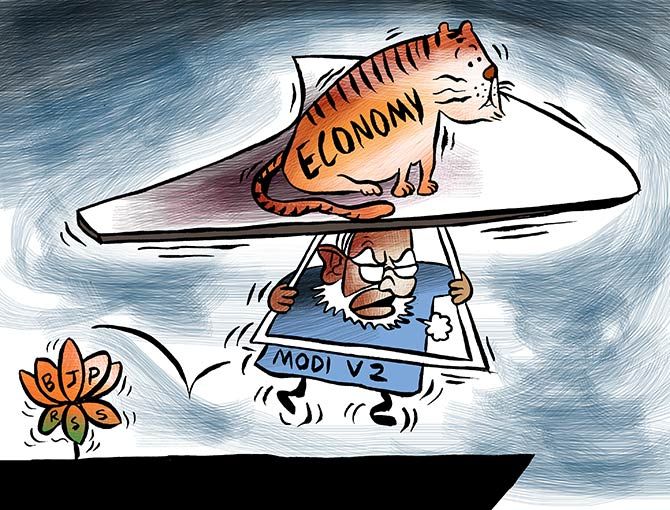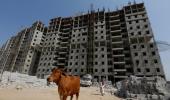The reform priorities are clear: enhance savings, improve productivity. Just 25 basis points of moving interest rate up or down would not boost investment: Former RBI Governor Y V Reddy.
Illustration: Uttam Ghosh/Rediff.com

There is a widespread demand for a fiscal stimulus, and if that happens, it should be “time bound” and “limited to the situational context”, former Reserve Bank of India (RBI) Governor Y V Reddy said recently.
Adding to the debate on whether the economy needs a fiscal or monetary stimulus, Reddy said the Monetary Policy Committee (MPC) of the RBI, too, should pitch in if required.
“The MPC can contribute by a monetary stimulus, or decide to hold its reins for a further time when the need would be dire. But in the current situation, I think the need (to stimulate) is clear,” he said.
The RBI should have flexibility in the inflation targeting framework, he said during a panel discussion, “India’s Current Macroeconomic Challenges”, organised by the National Council for Applied Economic Research (NCAER), a public think tank.
Former chief economic advisor Shankar Acharya, member of the 14th Finance Commission Sudipto Mundle were the other panelists.
While all of them agreed that the economy is going through a rough patch, they touched upon different possibilities that could help boost the economy.
“The reform priorities are clear: enhance savings, improve productivity. Just 25 basis points of moving interest rate up or down would not boost investment,” Reddy said.
Reddy said while tax concessions are one way of giving a stimulus through the Union Budget, making expenditure more targeted is a better way.
“(The government) should be careful in pumping the stimulus to infrastructure projects as they have a gestation period and a long-term commitment, and should be limited to serve the purpose of de-bottlenecking.
"Rather, a stimulus should significantly be through those central public enterprises that are highly leveraged,” he said.
The advice by former central bank governor assumes importance at a time when the economy grew at its slowest in five years in the March 2019 quarter.
"Finance Minister Nirmala Sitharaman will present her maiden Budget in July.
"Dissecting the domestic economic situation, Reddy said the slowdown is partially due to cyclical and some structural reasons.
“There is enough evidence of stagnant output, but no evidence of rising factor productivity. Household savings have started looking up only recently,” he said.
Balance sheets of different components of the economy are stressed, he added.
General government deficit is high, and its monetisaton by the RBI is at the highest in many years.
Though the worst is over for banks, credit growth to industry is still choked, and non-banking financial companies (NBFCs) have a solvency problem rather than a liquidity problem, he said.
Large corporate is highly leveraged, mostly through the external debt.
The external sector, though stable, is prone to shocks, Reddy said.
“Had some of them been in a strong position, the situation could have been handled. But it is difficult to manoeuvre policy when all the indicators appear stressed,” said the veteran Padma Vibhushan awardee.
Reddy said the state of financial sector has large fiscal implications, and strengthening the sector needs to be looked into.
“Short-term credit from the external sector should be limited, and we should aim for a zero current account deficit.
"Two per cent should be the upper limit during shock phase,” he suggested.
But he also said India was in a better position to handle the slowdown.
“Political system stability helps reforms, which was the case in the early 90s. But now we also have regime stability.
"The capacity of the government to handle shocks is more...not the ability, but capacity. That should give us confidence,” he said.










